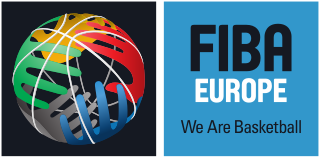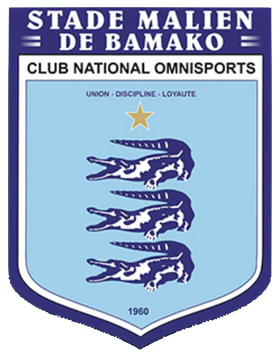| Medal record | ||
|---|---|---|
| AfroBasket | ||
| 2023 Rwanda | ||
Maimouna Haidara (born 2 June 2004) is a Malian basketball player who plays as a power forward for CDB Clarinos Tenerife and the Mali women's national basketball team.
| Medal record | ||
|---|---|---|
| AfroBasket | ||
| 2023 Rwanda | ||
Maimouna Haidara (born 2 June 2004) is a Malian basketball player who plays as a power forward for CDB Clarinos Tenerife and the Mali women's national basketball team.
She competed at the 2022 FIBA U18 Women's African Championship, [1] [2] and 2022 FIBA Women's Basketball World Cup. [3]
She played for Clarinos De La Laguna, and Adareva Tenerife. [4]

FIBA Europe is the administrative body for basketball in Europe, within the International Basketball Federation (FIBA), which includes all 50 national European basketball federations.

The Tunisian national basketball team, nicknamed Les Aigles de Carthage , is the national basketball team of Tunisia. The team is governed by the Tunisia Basketball Federation (FTBB).

The European Wheelchair Basketball Championship, is the main wheelchair basketball competition contested biennially by national teams governed by IWBF Europe, the European zone within the International Wheelchair Basketball Federation. The European Championship is also a qualifying tournament for the IWBF Wheelchair Basketball World Championships and the Paralympic Games.

Mali national basketball team represents Mali in men's international basketball competitions has yet to appear in the FIBA World Championship. Their best finish at the FIBA Africa Championship was in 1972 where they ended with a bronze medal.
The Nigeria women's national basketball team, also known as the D'Tigress, represents Nigeria in international women's basketball competition, and are regulated by the Nigeria Basketball Federation, the governing body for basketball in Nigeria. Nigeria has one of the most successful women's national teams on the African Continent, being the current African champions. They have won the Women's Afrobasket Championship consecutively for four (4) times in a roll and six (6) times in total. They won in 2017 at Bamako, Mali, 2019 at Dakar, Senegal, 2021 at Yaounde, Cameroun, and 2023 at Kigali, Rwanda.

The Senegal women's national basketball team is the national basketball team representing Senegal at world and continental basketball competitions for women. It is administered by the Fédération Sénégalaise de Basket-Ball.

The FIBA Intercontinental Cup, also commonly referred to as the FIBA World Cup for Champion Clubs, or the FIBA Club World Cup, is a professional basketball clubs competition that is endorsed by FIBA and the NBA. Historically, its purpose has been to gather the premier basketball clubs from each of the world's geographical zones, and to officially decide the best basketball club of the world, which is officially crowned as the world club champion. The World Cup for Clubs has been contended mainly by the champions of the continents and/or world geographical regions that are of the highest basketball levels.

The International Basketball Federation is an association of national organizations which governs the sport of basketball worldwide. FIBA defines the rules of basketball, specifies the equipment and facilities required, organizes international competitions, regulates the transfer of athletes across countries, and controls the appointment of international referees. A total of 212 national federations are now members, organized since 1989 into five zones: Africa, Americas, Asia, Europe, and Oceania.

The DR Congo national basketball team represents DR Congo in men's international basketball competitions, it is controlled by the Basketball Federation of Democratic Republic of Congo.
The 2011 FIBA Africa Under-16 Championship for Women was the 2nd U-16 FIBA Africa championship, played under the auspices of the Fédération Internationale de Basketball, the basketball sport governing body and qualified for the 2012 World Cup. The tournament was held from July 22–30 in Alexandria, Egypt, contested by 6 national teams and won by Mali.
Adaora Nnenna Elonu is a Nigerian-American professional basketball player and a member of the Nigeria women's national team. Elonu played college basketball for Texas A&M, with whom she won the 2011 NCAA Championship.
The 2018 FIBA Women's Basketball World Cup, the 18th edition of FIBA's premier international tournament for women's national basketball teams, was held in Tenerife, Canary Islands, Spain from 22 to 30 September 2018. This was the first edition to use the name of FIBA Women's Basketball World Cup. After the last edition in 2014, FIBA changed the name of the competition from the FIBA World Championship for Women, in order to align its name with that of the corresponding men's competition.
Siriman Kanouté is a Malian professional basketball player. He has starred for the Malian national junior teams on several occasions and trains with French club SLUC Nancy Basket.
Liz Mills is an Australian basketball coach who, since 2011, has coached elite level men's club and national basketball teams in Africa. Mills is currently the head coach of ABC Fighters of the Basketball Africa League (BAL).

Stade Malien is a Malian basketball team based in Bamako. It is part of the multi-sports club, which also has a football team and rugby team. Founded in 1960, Stade plays in the Ligue 1, the highest level of basketball in Mali. They play in the Basketball Africa League (BAL) in the 2023 season.
Aminata Traoré is a Malian basketball player. She plays for the Malian national team.
Djeneba Sangaré is a Malian basketball player. She plays for the Malian national team.
Anđela Delić is a Bosnian basketball player, playing as shooting guard. She played for CDB Clarinos Tenerife. She is a member of the women's basketball team of Bosnia and Herzegovina.
Shiori Yasuma is a Japanese basketball player, playing as point guard. She is a member of the Japan women's national basketball team.
Aika Hirashita is a Japanese basketball player, playing as shooting guard. She is a member of the Japan women's national basketball team.